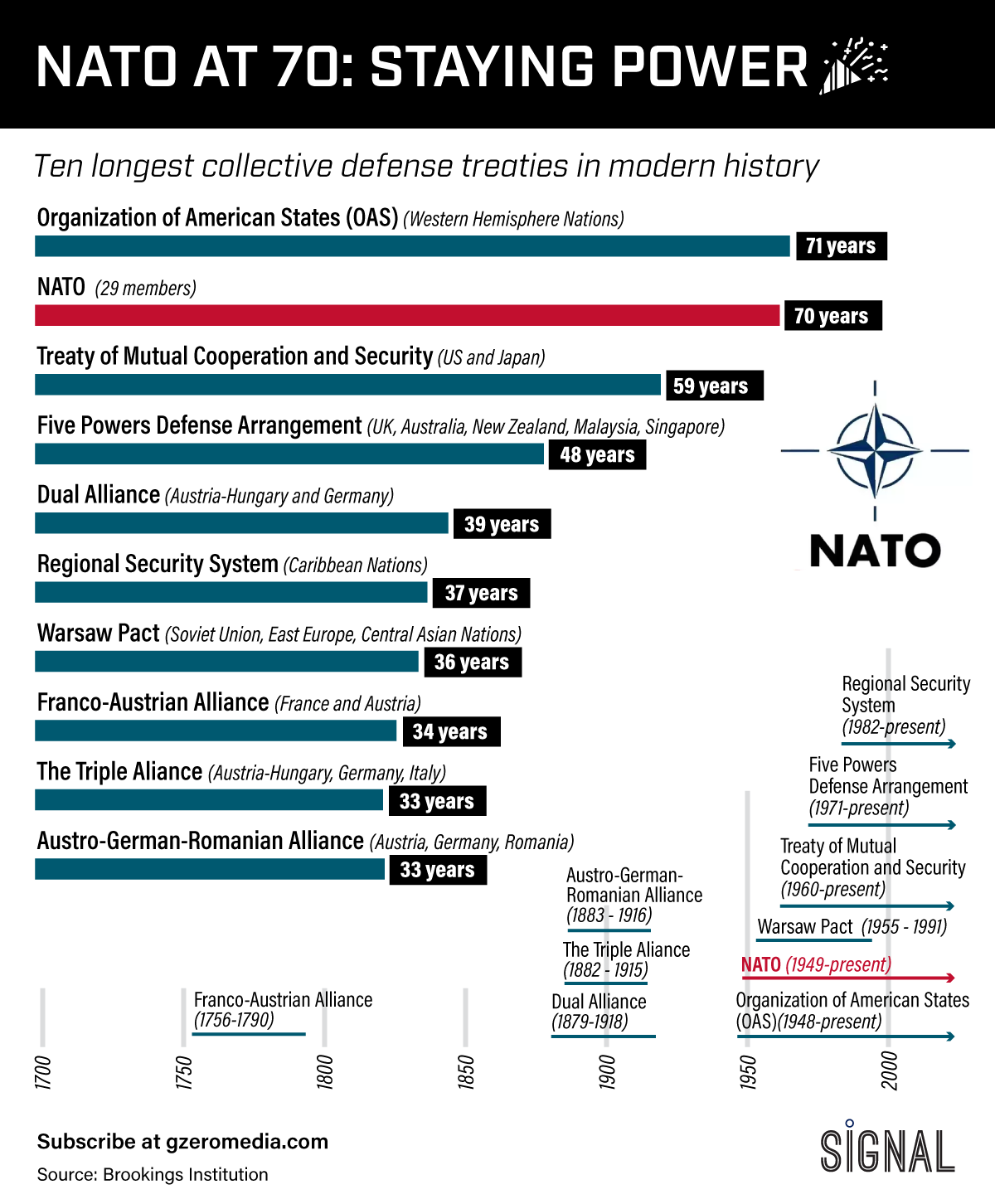Despite facing growing internal strains and new external challenges, the NATO alliance has successfully prevented conflict in Europe since its creation in the aftermath of World War II. That's quite an accomplishment. Consider this: in the past three centuries, only one similar collective defense agreement has lasted longer, according to a Brookings Institution study. The chart above puts NATO's longevity in historical context.
☰
More from GZERO Media
U.S. President Donald Trump delivers remarks on tariffs in the Rose Garden at the White House in Washington, D.C., U.S., April 2, 2025.
REUTERS/Carlos Barria
During a speech in White House Rose Garden on Wednesday, Donald Trump announced a 10% across-the-board tariff on US imports, with higher rates for countries that have a larger trade surplus with the United States – to the tune of 20% for the EU, 54% for China, and 46% for Vietnam, to name a few of the hardest-hit. Trump also confirmed that 25% levies on foreign-made cars and parts.
- YouTube
Trump is worried that Liberation day was a flop. Elon Musk has some ideas for how to make it Great Again. #PUPPETREGIME
Palestinians travel in vehicles between the northern and southern Gaza Strip along the Rashid Road on April 2, 2025.
Majdi Fathi/NurPhoto via Reuters
Israeli PM Benjamin Netanyahu said Wednesday that Israel was seizing more territory in Gaza to “divide up” the besieged enclave. He spoke as Israeli forces increased the intensity of their assault on Hamas in Gaza, which resumed two weeks ago after phase one of the ceasefire agreed to in January ended.
Vice President JD Vance and his wife, Usha Vance, tour the US military's Pituffik Space Base in Greenland on March 28, 2025.
JIM WATSON/Pool via REUTERS
How much would it cost for the United States to maintain Greenland as its territory? And what are the revenue possibilities from the Arctic island’s natural resources? Those are two questions the White House is reportedly looking into in the surest sign yet that Trump’s interest in Greenland is genuine.
Protesters demanded the ouster of South Korean President Yoon in central Seoul on March 29, 2025.
Lee Jae-Won/AFLO via Reuters
South Korea’s Constitutional Court will tie the legal bow on what has been a tumultuous period for the country as it rules Friday on whether to formally dismiss or reinstate impeached President Yoon Suk-yeol.
German police forcibly dispersed a pro-Palestinian protest in Berlin on Saturday, Feb. 8, 2025.
Michael Kuenne/PRESSCOV/Sipa USA via Reuters
Seventy percent of Americans are sports fans – and it shows in their spending. As they splurge on sports gear and attending live games, US households are spending an average of $1,112 annually on sports. Explore and subscribe to Bank of America Institute to learn how sports are shaping the business landscape.
Trump and Khamenei staring at eachother across an Iranian flag.
Jess Frampton
The United States is ramping up its “maximum pressure” campaign against Iran.
After voters elected her to the Wisconsin Supreme Court, liberal candidate Judge Susan Crawford celebrates with Wisconsin Supreme Court Judge Ann Walsh Bradley at her election night headquarters in Madison, Wisconsin, on April 1, 2025.
REUTERS/Vincent Alban
Republicans expanded their lean House majority after a pair of special elections in Florida, but a conservative candidate lost badly in a Wisconsin judicial race — despite a huge cash injection from Elon Musk.
© 2020 GZERO Media. All Rights Reserved | A Eurasia Group media company.
